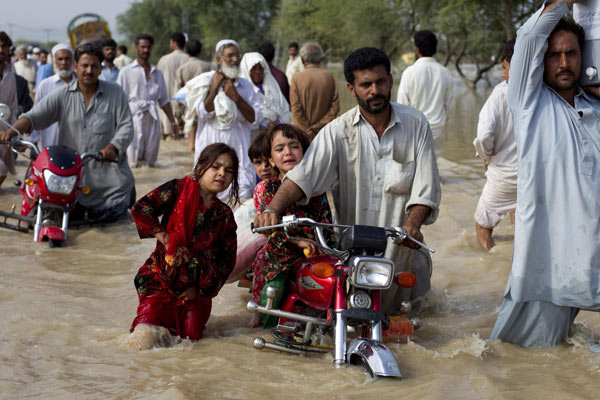Global General
Pakistan floods threaten to bring food crisis
(Agencies)
Updated: 2010-08-04 14:27
 |
Large Medium Small |
ISLAMABAD - Parts of northwest Pakistan inundated by the worst floods in 80 years face life-threatening food shortages, a United Nations aid agency said on Wednesday.
|
 A man evacuates his children through waist-deep waters after heavy flooding in Nowshera, located in Pakistan's northwest Khyber-Pakhtunkhwa Province August 1, 2010. [Agencies] |
World Food Programme (WFP) spokesman Amjad Jameel said the organisations' workers were urgently trying to reach flood areas in the northwest cut off from food supplies, which a UN aid agency said devastated the lives of over 3 million people.
Before the floods hit, a million people were already forced from their homes in the Pakistani northwest because of fighting between the army and Taliban militants.
"We have sent a request to the government and we are getting six helicopters from them and we will be doing air drops to the areas which are cut off," Jameel told Reuters in a telephone interview.
WFP teams doing field assesments since Tuesday may not be able to report their findings until Wednesday night, he said.
"You can imagine for five or six days floods have caused havoc in these areas. People have lost their food stocks. The markets are not up and running. Shops have collapsed. People are definitely in the greatest need of food," he said.
"That's what we fear. The need to rush to those areas which have been cut off for the past week to provide them with life-saving food."
More rains ahead
The flood catastrophe, which started almost a week ago and has killed more than 1,400 people, is likely to deepen as more rains are expected. A feared breakout of water-borne diseases such as cholera would create a health crisis.
The disaster has also, once again, called into question the leadership of Zardari, already hampered by problems ranging from a stubborn Taliban insurgency, widespread poverty to chronic power cuts.
Zardari's administration has faced a cascade of crises over the last few weeks, from the worst ever domestic plane crash on the edge of the capital to leaked reports on Islamabad's alleged support for militants battling US troops in Afghanistan, to diplomatic rows with Britain.
Stability here is vital to American interests in the region. Washington wants Islamabad to join efforts to tackle a Taliban insurgency raging in Afghanistan by cracking down on Afghan militants who cross over the border to attack US troops.
Islamist charities, some tied to militant groups allied with the Taliban and al Qaeda, are competing with the government to provide aid to the affected areas, boosting their credibility and support among the populace at the government's expense. A similar dynamic occurred after the 2005 Kashmir eathquake, which killed almost 75,000 people according to official figures.



